By Luke Smith · 6/7/2016

To effectively serve customers, companies and data center operators prefer a wide geographic presence with their data center locations. Multiple locations in multiple markets helps to reduce latency and offers the provider or user services within closer proximity to their customers. Because of this, primary and secondary data center markets have grown significantly in the East, Central and West areas of the United States. Seattle is an example of a market that has experienced growth due to its strategic location in the Northwest. Seattle’s location is not the only factor drawing data center growth to the city, however. Seattle offers data center users and providers many benefits, making it a very competitive and compelling data center market.
Operational Cost Advantages
The Seattle area offers operational cost advantages, especially when compared to West Coast data center markets like Silicon Valley and Los Angeles. The power cost difference alone can result in significant savings opportunities for end users comparing these markets. The cooler and consistent climate creates free cooling opportunities by reducing energy used to cool data centers on warmer days. Some well-built data centers can even achieve up to 10 months of free cooling in the Seattle area. Seattle also has access to low cost hydroelectric power, which appeals to companies working to reduce their overall environmental impact by using renewable energy.
Density of Fortune 500 and Tech Companies
Tech giants Microsoft and Amazon are both headquartered in Seattle, which has driven an increased presence of technology companies and jobs in the city. Seattle ranks 2nd in the nation in concentration for software programmers and engineers, and 3rd overall in the nation for ICT industry jobs, according to the Bureau of Labor Statistics. Seattle is also home to Fortune 500 companies, such as Starbucks, Nordstrom, and Costco, as well as manufacturing from Boeing. These companies are heavily invested in Seattle and prefer to expand within the market. Because of the major companies and technical talent in the Seattle area, the market is well positioned to accommodate continued data center growth by end users and data center operators.
Strategic Location
Seattle benefits from easy access to many large markets throughout the United States. The close proximity to Silicon Valley and Los Angeles allows for an easy interconnection to those cities, as well as a direct connection to the growing Portland (Hillsboro) market. Seattle acts as a fiber and connectivity gateway to international markets as well, with access to Canada through Vancouver, and Asia through the transpacific cables running directly from Seattle.
Seattle, similar to other large data center markets, has seen a maturation of services available as larger providers buy and improve existing data centers in the market. Companies like Digital Realty, Digital Fortress, and Green House Data have all delivered cloud and managed services to their data centers in Seattle over the last year. Recently, Microsoft has backed the New Cross Pacific Cable System, designed to increase speed and connectivity between the West Coast and Asia through Hillsboro, OR. With the increased cooperation between American and Asian companies, as well as the improved connectivity, it is likely that interest in the Seattle market will continue to grow.